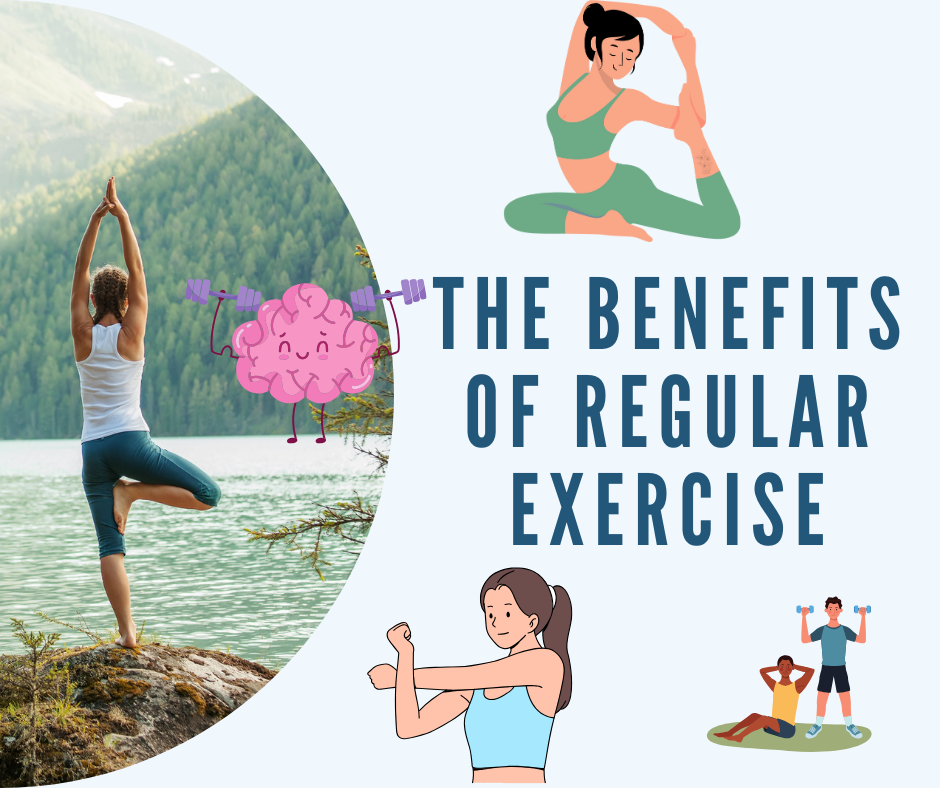The Benefits of Regular Exercise: Why Movement is Medicine

Regular exercise is one of the most effective ways to improve your physical, mental, and emotional well-being. From boosting energy levels to reducing the risk of chronic diseases, the benefits of exercise are well-documented. In this article, we’ll explore why movement is often called “medicine” and how you can incorporate exercise into your daily routine for a healthier, happier life.
Why is Exercise Important?
Exercise is not just about weight loss or building muscle—it’s a cornerstone of overall health. Here are some of the key reasons why regular physical activity is essential:
Improves Cardiovascular Health: Exercise strengthens your heart and improves circulation, reducing the risk of heart disease, stroke, and high blood pressure.
Boosts Mental Health: Physical activity releases endorphins, the “feel-good” hormones, which can reduce stress, anxiety, and depression.
Supports Weight Management: Regular exercise helps burn calories and build muscle, making it easier to maintain a healthy weight.
Enhances Immune Function: Moderate exercise can boost your immune system, helping your body fight off infections and illnesses.
Improves Sleep Quality: Physical activity can help you fall asleep faster and enjoy deeper, more restorative sleep.
Increases Energy Levels: Exercise improves oxygen and nutrient delivery to your tissues, boosting energy and reducing fatigue.
Strengthens Bones and Muscles: Weight-bearing exercises like walking, running, and strength training help maintain bone density and muscle mass, especially as you age.
Types of Exercise and Their Benefits
Aerobic Exercise: Activities like running, swimming, and cycling improve cardiovascular health and endurance.
Strength Training: Lifting weights or using resistance bands builds muscle, increases metabolism, and supports bone health.
Flexibility and Balance: Yoga, Pilates, and stretching exercises improve flexibility, reduce the risk of injury, and enhance balance.
High-Intensity Interval Training (HIIT): Short bursts of intense exercise followed by rest periods can burn calories efficiently and improve fitness levels.
How to Get Started with Exercise
Set Realistic Goals: Start with small, achievable goals, such as walking 30 minutes a day or doing a 10-minute home workout.
Choose Activities You Enjoy: Whether it’s dancing, hiking, or playing a sport, find activities that make you happy and keep you motivated.
Create a Routine: Schedule exercise into your daily routine, just like any other important task. Consistency is key.
Start Slowly: If you’re new to exercise, begin with low-impact activities like walking or swimming and gradually increase intensity.
Track Your Progress: Use a fitness app or journal to track your workouts and celebrate your achievements.
Stay Hydrated and Fuel Your Body: Drink plenty of water and eat a balanced diet to support your energy levels and recovery.
Tips for Staying Motivated
Find a Workout Buddy: Exercising with a friend can make workouts more enjoyable and keep you accountable.
Mix It Up: Try different types of exercise to prevent boredom and challenge your body in new ways.
Reward Yourself: Celebrate milestones with non-food rewards, like new workout gear or a relaxing massage.
Focus on How You Feel: Pay attention to the mental and physical benefits of exercise, such as improved mood and increased energy.
Common Myths About Exercise
Myth: You Need to Exercise for Hours to See Results
Fact: Even 20–30 minutes of moderate exercise daily can provide significant health benefits.
Myth: Exercise is Only for Weight Loss
Fact: Exercise offers numerous benefits beyond weight loss, including improved mental health, stronger bones, and better sleep.
Myth: You Can’t Exercise if You’re Older
Fact: Exercise is beneficial at any age. Low-impact activities like walking, swimming, or yoga are great options for older adults.
Frequently Asked Questions (FAQs)
- How much exercise do I need?
The World Health Organization recommends at least 150 minutes of moderate-intensity aerobic activity or 75 minutes of vigorous-intensity activity per week, along with muscle-strengthening activities twice a week. - Can exercise improve mental health?
Yes, exercise releases endorphins, which can reduce stress, anxiety, and depression while boosting mood and overall well-being. - What’s the best type of exercise for beginners?
Low-impact activities like walking, swimming, or yoga are great options for beginners. - How can I stay motivated to exercise?
Set realistic goals, find activities you enjoy, and track your progress. Exercising with a friend can also help keep you accountable. - Is it safe to exercise if I have a health condition?
Always consult your healthcare provider before starting a new exercise program, especially if you have a pre-existing condition
Conclusion
Regular exercise is a powerful tool for improving your physical, mental, and emotional health. Whether you’re a fitness enthusiast or just starting out, incorporating movement into your daily routine can transform your life. Remember, the best exercise is the one you enjoy and can stick with consistently. Start small, stay consistent, and enjoy the journey to a healthier you.
Disclaimer
This article is for informational purposes only and is not intended to replace professional medical advice, diagnosis, or treatment. Always consult a qualified healthcare provider before starting a new exercise program, especially if you have pre-existing health conditions
Related Posts

Gut Health for Americans: Best Probiotics, Fermented Foods & Fiber Tips (2025)

The Impact of Blue Light on Sleep and Eye Health

The Benefits of Green Tea Why It’s a Superfood for Your Health
About Author
samxiya kafle
I am Samxiya Kafle, a health and wellness writer with five years of experience in creating content related to health and well-being. I have written extensively on topics like natural remedies, preventive care, nutrition, mindfulness, and the role of technology in improving health. My work focuses on simplifying complex health information to make it easy for everyone to understand and apply in their daily lives. Over the past five years, I have contributed to various platforms, including blogs, websites, and publications, reaching diverse audiences. My writing not only educates but also empowers people to take charge of their physical and mental health. By combining research-backed insights with practical advice, I aim to inspire healthier lifestyles and highlight how modern innovations can support overall well-being.